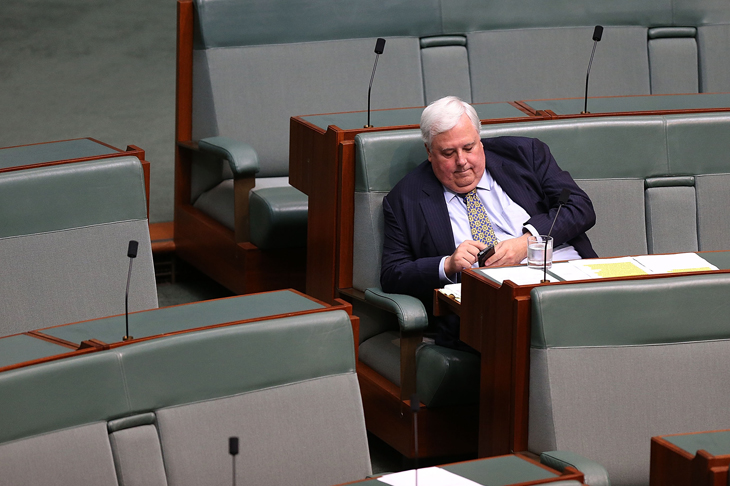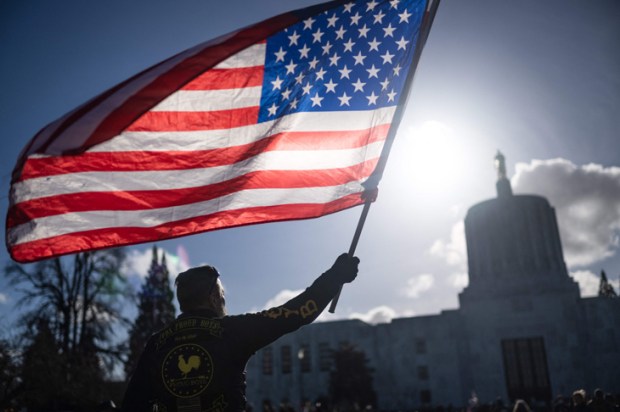Is it possible to buy your way into the federal parliament? It seems that we are about to find out via restored rich-lister Clive Palmer’s absolutely unprecedented multi-million dollar advertising barrage for a return to the parliament he so ignominiously exited just three years ago.
Exactly how much MPs and political parties spend in order to help get themselves elected is quite hard to pin down. There are the spending returns that registered parties are required to lodge with the Australian Electoral Commission that reckon the Liberal/National coalition and the Labor party spent $39.5 million and $35 million respectively for the 2016 federal poll.
Then there’s money spent by other entities (such as the unions and GetUp!) that can massively augment parties’ campaigns. For big party candidates, their individual spending is often buried in the party’s overall returns. And for sitting MPs there’s hundreds of thousands of dollars’ worth of electoral ‘entitlements’ that can provide ‘information’ helpful to their re-election.
But for most candidates, for political parties, and for most community groups, their campaign spending is a function of how much they can raise – and there are limits on what most people will donate, especially to get someone else elected. At the last election, Malcolm Turnbull reportedly donated $1.7 million of his own money (or about a mere 1 per cent of his estimated $200 million fortune) although in Turnbull’s case it was to keep himself in the Lodge. Even a union such as the CFMEU with hundreds of millions in assets, has rules, internal processes and many other costly activities that put limits on how much can be spent backing its preferred candidates.
For candidate Palmer, though, it seems that there’s virtually no retail space or time on the airwaves that he won’t buy in order to further his electoral chances. And with his net worth just-now estimated at $1.8 billion, that’s the biggest political war chest Australia has ever seen, by an almost incomprehensibly large margin.
At the 2013 election Palmer spent $3 million on advertising (according to the industry monitor Ebiquity) and over $10 million (by his own boast) to get himself elected to the House of Representatives and three Palmer candidates elected to the Senate. In the House, where his vote didn’t really count, Palmer missed about as many divisions as he attended. In the Senate, where Palmer’s senators mattered (until two of the three defected), his party’s regular tactic was to string legislation out and then vote against it. With the 2016 election looming, plus bankruptcy for his Townsville nickel refinery, Palmer departed political life.
But bold-as-brass and with massive cash flow once more, he’s now threatening to spend $50 million (according to his spokesman) or as much as it takes on electing lower house and Senate candidates throughout Australia. This is despite an estimated $300 million in unpaid nickel refinery debts, including almost $70 million to reimburse the taxpayer for some 800 sacked workers’ redundancy entitlements.
In the lead up to the 2007 election, the ACTU spent many millions on its ‘your rights at work’ campaign that was directed against the Howard government’s industrial policies but was not specifically promoting the Labor party or any of its candidates.
Since last September, though, and the court-ordered restoration of his mining royalties, months and months before the beginning of the actual federal election campaign, candidate Palmer has already been spending an estimated $1 million a month on radio and TV ads, let alone on billboards, newspaper spreads, and unsolicited robo-text messages sent to hundred of thousands of citizens. If someone is prepared to spend on this scale in the electoral phoney war, think how much more can be expected once the battle is joined in earnest.
Even now, there’s scarcely an ad break on talk radio or on pay TV that doesn’t feature a little homily from Clive; and scarcely a main road that doesn’t feature a Palmer billboard echoing Donald Trump’s slogan to make our country great again.
Amid sensible aspirations like coal-fired power stations, lower immigration, and even (at a pinch) very fast trains between nearby cities, there are the magic puddings that are always the hallmark of the political fantasist: including more GST revenue in Western Australia, less tax in Tasmania and Queensland, and fiddles like changing the timing of tax payments throughout Australia.
Political parties and candidates that have to solicit donations and recruit volunteers face a level of democratic accountability and checks and balances that are unknown to someone who can fund his own campaign, employ his own candidates, and pay his own polling booth workers. It’s tempting to dismiss Palmer as an unelectable charlatan or a self-indulgent political exhibitionist. But you don’t spend tens of millions if you’re not serious. Advertisers don’t spend large amounts of money on radio and TV because they think that good products sell themselves. They think that advertising can often be the difference between commercial success and failure. They spend up big so that consumers might buy what they otherwise would not. If the same logic applies to politics, Palmer has to spend big because few would vote for him on the basis of his past political and public achievements.
We’ve long known that money buys influence. When a minister or shadow minister is deciding who to fit into an overcrowded diary, the big donor is always going to have more priority than the mere voter. What we’re about to discover is whether money can buy seats in the House of Representatives and the Senate. We’re about to discover whether, in a modern democracy like ours, parliamentary numbers can be orchestrated in the way the Duke of Newcastle once controlled his pocket boroughs.
Is this really what we want for our federal parliament?
Got something to add? Join the discussion and comment below.
Get 10 issues for just $10
Subscribe to The Spectator Australia today for the next 10 magazine issues, plus full online access, for just $10.
You might disagree with half of it, but you’ll enjoy reading all of it. Try your first month for free, then just $2 a week for the remainder of your first year.














Comments
Don't miss out
Join the conversation with other Spectator Australia readers. Subscribe to leave a comment.
SUBSCRIBEAlready a subscriber? Log in